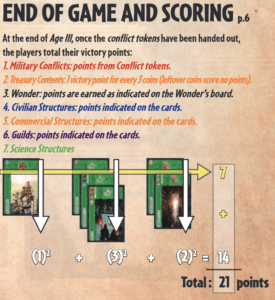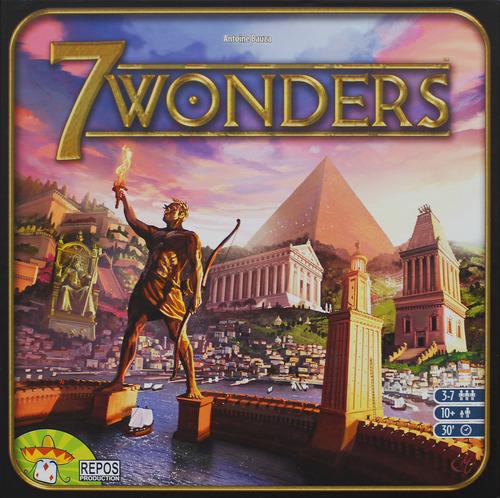Basic information
- Name of game: 7 Wonders
- Created by: Antoine Bauza
- Platform: tabletop
Formal elements
- Players: multilateral competition
- Objective: construction
- Outcomes: non zero-sum game
- Procedures & rules: There are three rounds, or Ages. In each round, players start with 7 Age Cards, representing resource production, commercial activity, or military. All players simultaneously play one Age Card, building some aspect of their civilization, and pass the rest clockwise, earning Victory Points on the way. Once the hand has been depleted, players engage in military conflict with their neighbors, and the round ends. The three rounds build upon each other and increase in complexity. The player who ends up with the greatest civilization (represented by the most Victory Points) wins.
- Resources: 7 Wonder Boards, 49 Age I Cards, 49 Age II Cards, 50 Age III Cards, 46 Conflict Tokens, 24 Value-3 Coins, 47 Value-1 Coins
- Boundaries: the tabletop
Main types of fun achieved
- Challenge: Players need to have multiple game plans to win. Formulating these strategies need critical thinking and creativity, and these challenges are what make the game stand out.
- Competition: This is a multiplayer game of up to 7 players. I really experienced competition when I was trying to outwit my opponents, such as playing mind games to create truces or betrayals in military conflict.
Moments of success/fails and changes I would make
7 Wonders easily makes my top-five all-time favorite board games. I particularly like its flexibility of game strategies, as players can accumulate Victory Points by focusing on different aspects of their civilizations. This makes each game unique. I experienced success when I exploited a strategy that nobody else was exploiting, such as hoarding all the blue cards to earn Victory Points directly, while other players were competing for green cards and red cards for Science and Military. I experienced failure when other players were going for the same strategy as me. The only thing that I don’t like about the game is how it has a steep learning curve. Some of my friends didn’t want to learn it because there are so many types of Age Cards and ways to earn Victory Points, and the tutorial video was 10 minutes long.
4 types of game balance:
- Balance in single-player games:
- Not applicable because this is a multi-player game
- Balance in asymmetric games:
- This game is asymmetric because the players start with different Wonder Boards. This makes it hard for the game to be truly balanced. The “A” side of each board usually provides fewer opportunities for specialization than their “B” side counterpart. There also exists “tier lists” with statistics indicating that certain starting Wonder Boards have a higher win rate than others.
- Balance between strategies:
- Even though the boards are not designed to be strictly balanced, they are designed to work best with different play strategies. There are multiple paths to victory, and I would say overall, the strategies are balanced. 7 Wonders is highly interactive, so your choices affect your opponents’ and vice versa. However, if you find that your opponent is exploiting a strategy, you can choose to exploit another to compensate, and in most cases, victory depends on not the strategy you choose, but on the mastery of your chosen strategy.

The various strategies one can exploit to earn Victory Points.
- Balance between game objects:
- The game objects are not strictly balanced. For example, some resources (wood, ore, brick) are more important early-game, while other resources (glass, papyrus, textile) become more valuable late-game. So depending on the current state of the game, some game objects/cards/resources will be more powerful than others.
3 ways to balance game objects:
- Transitive:
- The cost curve in this game is mostly linear. For example, a card that is twice as powerful costs twice as more resources to play.
- Intransitive:
- I do not see any intransitive balances in this game, because no game object is inherently superior or inferior to others. It all depends on what the player and opponents do with the game objects.
- Fruity:
- 7 Wonders has a fruity balance. Each Wonder Board is uniquely different from others such that direct comparisons are impossible. Formal and numerical comparisons between Wonder Boards cannot work, and the only way to balance the game is through excessive playtesting.



